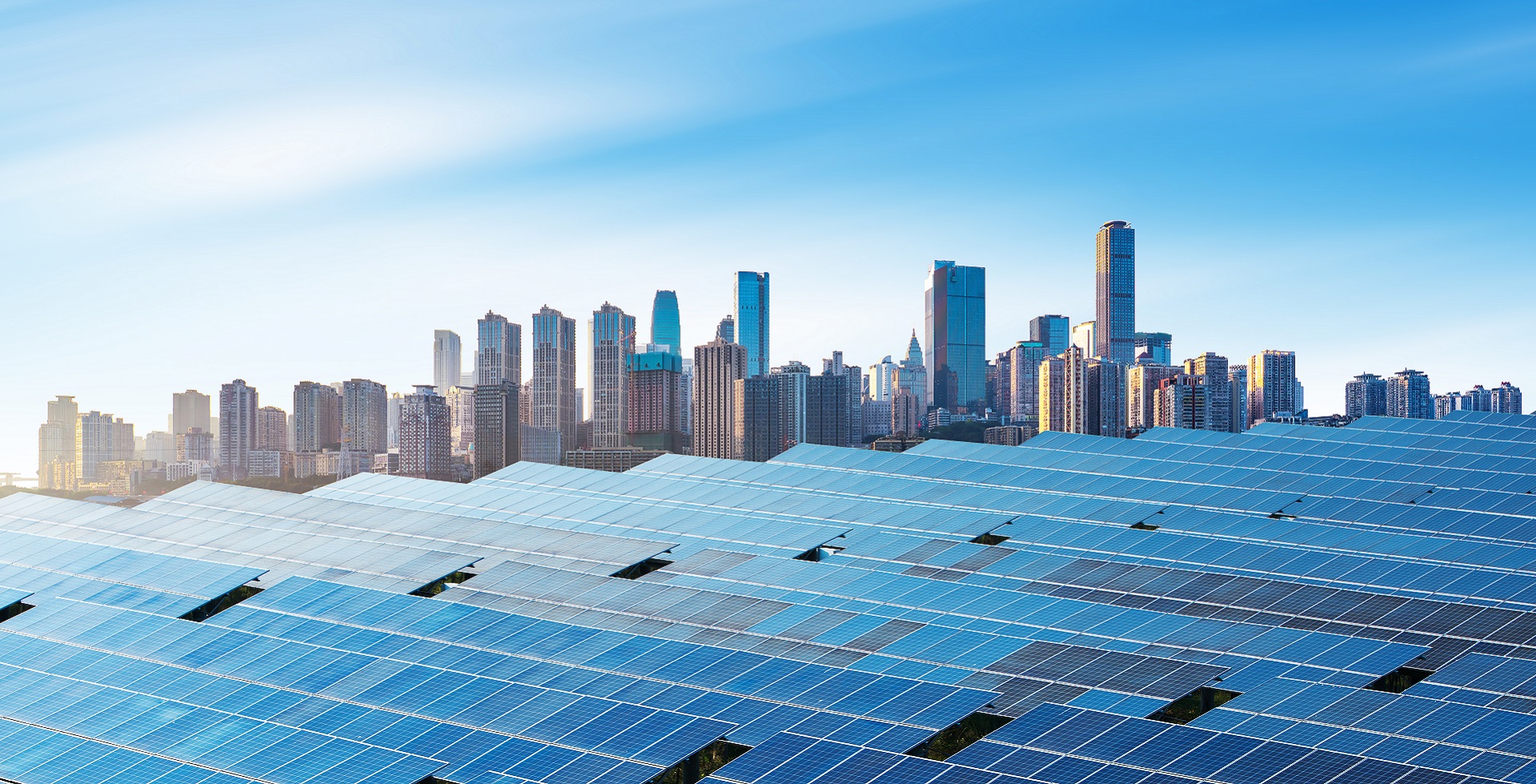Growth. The China Way.
Why China’s 2060 net-zero carbon goal matters today

Summary
Decarbonising a country that burns half of the world’s coal every year is a huge task. Yet the transition will bring investment opportunities in both “new-economy” and “old-economy” sectors.
Key takeaways
|
When President Xi Jinping told the UN General Assembly in September 2020 that China would reach peak carbon emissions by 2030, and be fully carbon-neutral by 2060, his remarks drew great interest. China is an industrial powerhouse and the world’s biggest emitter of CO2 – bigger than the US, UK and EU combined.1 So if China manages to reach its goal, it would do more than help slow global warming. China’s success would transform industries and supply chains both at home and around the world.
Even so, 2060 is almost 40 years away, and Mr Xi’s surprise announcement did not reveal any details of how this commitment would be achieved. As a result, some critics saw little reason to expect immediate change. Yet nothing could be further from the truth. Not only did the president’s statement mark the beginning of a long race to “net zero”, but changes are already happening surprisingly quickly.
Carbon neutrality is a key part of China’s strategic transformation
Mr Xi’s commitment to carbon neutrality by 2060 means China is joining forces with other major economies to help cool a warming planet. At the same time, China’s pledge is about more than being a responsible global citizen, because carbon neutrality serves China’s long-term strategic interests on many fronts:
- China’s transition to clean energy will create new industries that drive economic growth.
- Carbon neutrality will also help China upgrade its domestic manufacturing capabilities and speed the development and adoption of advanced technologies. This is fully consistent with China’s aim for technological self-sufficiency in strategically important areas such as new energy, 5G and smart manufacturing. And it is even more important for China’s long-term security, given the backdrop of ongoing US-China geopolitical and technological tension.
- In addition, the widespread adoption of electric vehicles by China’s massive population would not only create domestic companies that are also global leaders, but it would help China reduce its dependency on imported oil and gas. China is the world’s largest importer of crude oil, accounting for approximately a quarter of the world’s total oil imports in 2020.2
- Last but not least, achieving carbon neutrality could help foster more equitable, sustainable development within China
This last point is particularly important given China’s new focus on “common prosperity”. For example, consider Northwest China. It is a geographical region that has historically been underdeveloped due to problems with water scarcity and poor transportation networks. Yet it is actually rich in wind and sunshine – two of the main ingredients for renewable energy generation. That’s why China is looking at improving this region’s infrastructure in a sustainable way.
“If you think about first-tier Chinese cities such as, Shanghai, Guangdong and Shenzhen, many of them are along the coast,” explained Shannon Zheng, Senior Product Specialist, at Allianz Global Investors’ Asia Conference in June 2021. “So developing renewable energy in Northwest China can bring advanced industrial manufacturing capabilities – and all the ensuing economic benefits – to relatively underdeveloped regions. If done properly, this should help bridge inequalities between coastal and inland regions.”
China’s ambitious targets start from a low base
Although China has pledged to achieve net-zero emissions, it must make a significant effort to get there. That’s in large part because China’s current growth model still relies on burning fossil fuels, particularly in heavy industry. Coal is an abundant natural resource in China, which explains why coal accounts for about 60% of total power generation. Every year China burns half of all the coal used globally – primarily for energy generation, but also to make steel and cement. Indeed, China produces more than half of the world’s supply of these basic construction materials.3
Fortunately, China is already making some progress. Its ratio of CO2 emissions to GDP has been falling for at least 15 years.4 However, for China to fulfil Mr Xi’s pledge, it’s estimated that renewable energy – which includes solar, wind, hydro and nuclear energy – needs to account for 90% of the country’s generated power by 2045.5 That means solar energy generation capacity alone needs to increase by an estimated 16 times just to match up with the huge demand created by China’s massive economy.
Low-carbon investment opportunities
The good news for investors is that the enormous scale of China’s energy transition creates investment opportunities across a range of sectors. The solar industry, for instance, is looking more attractive as falling solar panel prices help make sun-generated power more competitive with fossil fuel-generated power.
“The cost reduction over the past few years and the lower reliance on subsidies have turned the solar sector from a more technical, policy-driven sector to a more structural, fundamentals-driven sector,” says Allianz Global Investors Portfolio Manager Kevin You. “Which means that the solar sector is now more investable compared to a decade ago.”
When it comes to cars, China’s government has announced its aim for electric vehicles to make up 20% of sales by 2025 and 40% by 2030. That should lead to investment opportunities along the supply chain, from battery materials to electronic parts, as well as many opportunities in the field of autonomous driving.
Even old-economy heavy-industry companies, which may struggle to reduce their use of fossil fuels, will have opportunities. Mr You believes that early corporate movers in this area may emerge as tomorrow’s leaders. Already, there are examples of China’s steel makers exploring hydrogen-based steelmaking technology – which produces iron with hydrogen instead of coal – and improving their carbon-capture technologies.
China’s huge push to reach carbon neutrality is more than just a slogan. It has imminent implications for China’s economy and financial markets, especially as Mr Xi’s 2030 target for peak emissions is close at hand. As momentum builds, select new-economy companies could experience helpful tailwinds, while old-economy companies that are willing to transform themselves may gain market share and grow into future leaders.
1Source: European Commission Joint Research Centre, Emission Database for Global Atmospheric Research version 5.0, Allianz Global Investors. Data as at December 2019.
2Source: International Trade Centre (ITC) as at 2020.
3Source: US Geological Survey Cement Statistics. Data as at 31 December 2019. World Steel Association, as at 31 December 2019.
4Source: European Commission Joint Research Centre, Emission Database for Global Atmospheric Research version 5.0, Allianz Global Investors. Data as at 31 December 2019.
5Source: Goldman Sachs as at January 2021.
Tackling air pollution with sustainable investments

Summary
Anthropogenic air pollution constitutes one of the most serious threats to human health, affecting lifestyle habits as well as causing deep social concerns and economic disruption. The deterioration of air quality – both outdoor and indoor – not only costs innumerable lives, and significantly diminishes life expectancy but is also a major burden on the global economy, triggering billions of costs. Explore how sustainable investments can help to address the most pressing air-pollution-related challenges.
Key takeaways:
- Anthropogenic air pollution constitutes one of the most serious threats to human health, affecting lifestyle habits as well as causing deep social concerns and economic disruption.
- The deterioration of air quality – both outdoor and indoor – costs innumerable lives, and significantly diminishes life expectancy.
- As stated by the World Health Organisation (WHO), “91% of the world’s population breathes air that is not safe.”
- Air pollution is also a major burden on the global economy, triggering billions of costs due to, amongst other things, work absence and lower productivity.
- Investments in innovative companies that produce clean energy from sustainable sources, or manufacture highly elaborate industrial filtration systems, can help to address the most pressing air-pollution-related challenges

